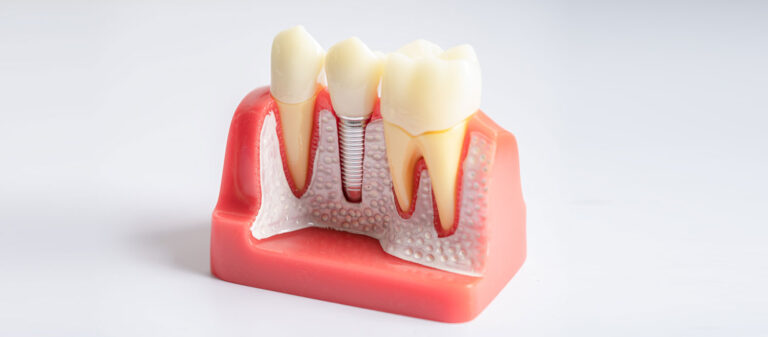
Periimplantitis What is it? Is it treatable?
Dental implant procedures are, nowadays, one of the safest and most effective solutions to rehabilitate the oral cavity when one or more teeth have been lost.
According to the latest data from the Spanish Society of Periodontology and Osseointegration (Sociedad Española de Periodoncia y Osteointegración)treatments with these small devices are becoming increasingly predictable, safe, aesthetic and long-lasting. However, they are not free from some oral complications after the procedure.
What is periimplantitis?
Peri–implantitis is an inflammatory process that affects the tissues surrounding the dental implant and, at the same time, causes bone loss in the area of the implant.
There are two types of peri-implant disease:
- Periimplantitis: inflammation of the existing tissues around the implant occurs. This results in bone loss, which is serious because it endangers the stability of the implant.
- Peri-implant mucositis: inflammation of the soft tissues and mucous membranes surrounding the implant, but without affecting the bone. This is the initial stage of the infection and, if not corrected in time, it may worsen.
The latest professional studies on the subject show that 40% have peri-implant mucositis.. But, as with gingivitis, if the right treatment is applied and, above all, if it is diagnosed in time, it should not cause too much discomfort, as it is a transitory problem that can be cured.
On the other hand, about 20% of the population shows peri-implantitis, a more serious case which, if left untreated, leads to the eventual loss of the implant.
Symptoms of peri-implant diseases:
Peri-implant symptomatology is indeed very similar to the warning signs of the development of periodontitis in a patient’s natural teeth:
- Inflammation and redness of the peri-implant mucosa.
- Occasionally, bleeding during periodontal probing.This is during the evaluation of the gingival tissues. Through this examination, the periodontist can determine the degree of involvement and damage to the gums and the bone supporting the implant. By probing, it is possible to determine the distance from the gingival margin to the base of the periodontal pocket and the presence of bacterial plaque or tartar. Peri-implantitis is a increase in the depth of the peri-implant pocket.
- Certain discomfort when clenching teeth.
- In some cases, purulent suppuration.
- Loss of bone mass, noticeable in radiological tests (symptoms typical of peri-implantis).
- Mobility of the implant, in situations where the disease is in an advanced stage of development (symptoms typical of peri-implantis).
In any case, it is important that, in the event of any of these symptoms, the patient should see a dentist immediately. However, at first, the disease can often go unnoticed.
Causes of periimplantitis
There are several factors that can lead to the development of peri-implantitis. Some are unrelated to the patient and others are the result of the patient’s state of health or are the consequence of other diseases. The main causes are:
- Previous periodontal diseases: There are patient profiles with a tendency to develop periodontal disease due to causes unrelated to their hygiene habits: the structure and morphology of their teeth can lead to the accumulation of plaque. If you were prone to developing gum problems before getting implants, you have a higher chance of developing peri-implantitis. In this case, it is highly recommended that you take extreme care of your mouth at all times, as well as visiting your dentist regularly.
- Poor or insufficient oral hygiene: This is one of the issues that most influences the appearance of peri-implantitis, as is the case with other gingival infections.. To avoid it, the most important thing is to maintain good daily hygiene, brushing properly, even using special products and tools for people with implants, and to accompany it with a prophylaxis treatment in a dental clinic every 4 to 6 months. As you know, prevention is the best way to keep any type of infection in the oral cavity at bay.
- Excessive alcohol consumption and smoking: these habits are another of the main factors that can multiply the proliferation of infections in the mouth.
- Poor implant installation: We always advise you to go to an expert for any dental treatment that requires a minimum of complexity. Following this guideline is essential, as poor implant placement is a major risk factor for the development of peri-implantitis. The only way to be safe from this issue is to always have top quality dental implants installed and to be very aware of the specialisation of the implantologist in whose hands you put yourself.
- Diabetes: this disease may influence the development of peri-implant diseases. The lesions in the bone surrounding the implants caused by the infection bacteria do not regenerate as well in patients with this disease due to their high blood glucose levels.
What problems can peri-implantitis lead to?
People suffering from peri-implantitis often suffer from the following:
- Constant bleeding of the gums. It happens especially if it is not treated in time. In the first stage of infection, bleeding occurs during brushing or eating. At a higher stage, it will go from being occasional to much more frequent, and may even occur at any time of the day.
- Mobility of the prosthesis. The bacteria that cause mucositis and peri-implantitis damage the gum tissue that surrounds the implant: they progressively deteriorate it, causing the implants to move or fall out at a very advanced stage.
- Bone loss. If perimplantitis becomes severe, it can also affect the natural teeth around the implant.
How to solve them?
The first step to take if you have or think you have peri-implantitis is to see an implantologist. There, you will undergo a complete check-up and, at least for as long as possible, you will be given all the necessary treatments to eradicate it and thus try to avoid the removal of the implant.
In the consultation room, guidelines are given to reinforce the hygiene routine at home and the prosthesis is modified, if its design prevents proper regular cleaning. Then the plaque or tartar, supra or subgingival, which the patient cannot remove through deep cleaning, is removed.
If the diagnosis is mucositis (the initial stage) the problem is usually resolved. If peri-implantitis has already progressed to peri-implantitis, surgical treatment must be added to the above:
- Removal of granulation tissue. It is performed to allow access to the implant surface (where the source of the problem lies).
- Subgingival scraping. Instrumentation of the implant in the most respectful way possible, in order to maintain its characteristics and facilitate the reinsertion or regeneration of the tissue. This practice removes the bacterial plaque adhering to the implant surface.
- Depending on the damage the infection has caused, the procedure will be either resorptive or regenerative.. The first will be remodelled gum and bone and the tissues are repositioned to remove the pockets caused by the infection. This achieves the elimination of infection and, in addition, facilitates hygiene for the patient and maintenance for the professional in the medium and long term.
- If the morphology of the defect allows it, the ideal would be to apply regenerative treatment so that bone grafts and biomaterials can be used to recover the lost tissues.
Tips to prevent peri-implantitis
Although there are no definitive guidelines to eradicate the possibility of peri-implantitis, there are some tips to reduce its occurrence to a minimum. These are as follows:
- Take the maximum care of your dental hygiene: proper brushing and rinsing, along with flossing, are the main routines to follow at home on a daily basis to avoid this disease.
- Avoid smoking and alcohol consumption: end bad habits or reduce them to a minimum. As we have already mentioned, it has been more than proven by experts that smokers are more prone to peri-implantitis. Tobacco smoke causes tissue irritation, decreases blood supply, delays healing and increases the risk of infection. Alcohol is also a great friend of the development of bacterial plaque and, with it, infectious diseases.
- Dental cleaning programme: it is very important that you have regular professional cleanings. Always go to a specialised clinic. If inspections and cleaning are carried out by a professional, the proliferation of bacteria, tartar and other harmful elements is greatly delayed.
- Choose an experienced implantologist: This is the main advice we will always give you when it comes to getting implants. In the hands of a specialised professional with years of experience, the risk of peri-implantitis due to improper placement is greatly reduced. It is the professional implantologist who will assess whether the bone supporting the implant meets the necessary conditions for correct osseointegration. He is also responsible for practising the best implant placement technique according to the morphology and needs of each patient, always trying to avoid subsequent complications.
